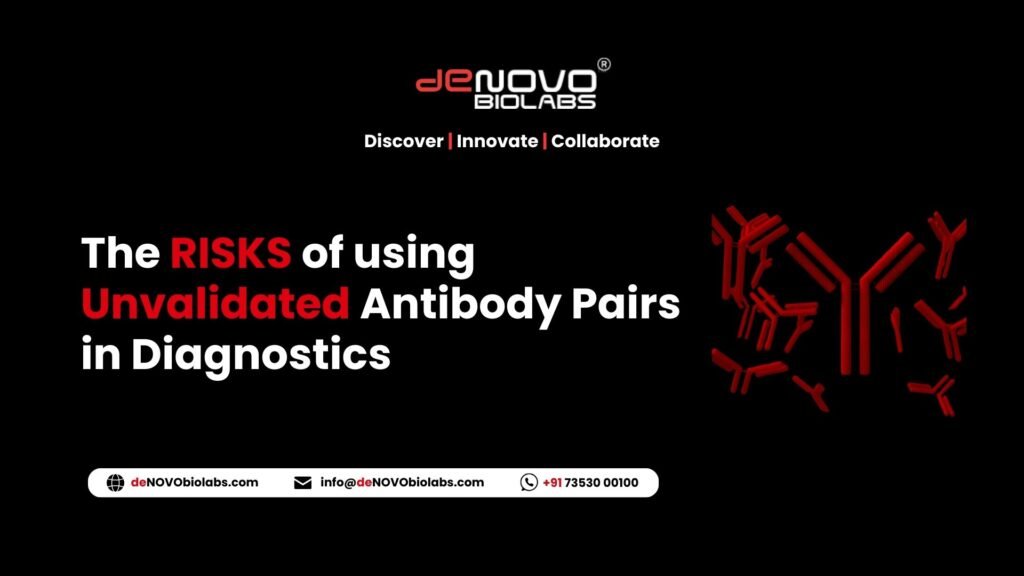
In diagnostic manufacturing, speed and cost pressures often tempt manufacturers to cut corners on antibody selection. However, using unvalidated antibody pairs, especially in Lateral Flow Assays (LFAs) for targets like Dengue NS1 or HBsAg can introduce hidden costs that ultimately outweigh any short-term savings.
According to the WHO, over 70% of clinical decisions depend on diagnostic tests (WHO). A compromised assay, caused by weak or cross-reactive antibody pairs, risks not only patient outcomes but also the credibility of diagnostic manufacturers.
Here are the Top 3 hidden costs diagnostic manufactures face when using unvalidated antibody pairs.
1. Product Development Delays
Unvalidated pairs often fail to perform under real-world assay conditions—leading to repeated troubleshooting cycles.
- Re-optimization costs:
Manufacturers may spend months re-validating conjugation chemistries, buffer conditions and strip materials, all because the initial antibodies were not LFA-compatible. - Time-to-market impact:
In infectious disease diagnostics, every lost month means competitors capture market share. For fast-moving diseases like dengue or hepatitis outbreaks, delays can be catastrophic.
A study on Dengue NS1 LFAs showed that assays using poorly characterized antibodies had sensitivity as low as 60%, compared to 90%+ with optimized, validated pairs
(Frontiers in Immunology).
Bottom Line: Delayed launches mean lost revenue and missed public health impact.
2. Regulatory & Quality Risks
Diagnostic kits are held to strict standards for sensitivity, specificity, and reproducibility. Unvalidated antibodies create risks at every stage:
- Regulatory hurdles:
CE-IVD and FDA submissions may be rejected if antibody performance data doesn’t meet minimum criteria. - Batch inconsistency:
Without validation, lot-to-lot variability can lead to field failures once products are scaled. - Increased QA/QC burden:
Manufacturers spend excessive time and resources on stability studies and cross-reactivity checks.
WHO recommends HBsAg LFAs demonstrate >99% sensitivity and >98% specificity for clinical use. Unvalidated pairs make these benchmarks difficult to achieve.
Micromachines, MDPI
Note: Poor-quality reagents risk regulatory delays, recalls, or loss of customer trust.
3. Reputational & Financial Losses
Diagnostics are only as strong as their weakest link. A single underperforming antibody pair can compromise the credibility of an entire product line.
- Brand reputation:
Diagnostic companies depend on trust. False negatives or positives erode clinician and distributor confidence. - Financial fallout:
A failed product launch costs hundreds of thousands to millions in wasted R&D, marketing, and distribution spend. - Lost partnerships:
CROs and healthcare providers are less likely to partner with companies associated with unreliable assays.
The global rapid diagnostic test market is expected to reach USD 62.34 billion by 2032 (Market.us).
In such a competitive space, reputational damage from unvalidated antibodies can permanently limit growth.
PSA: Saving on antibodies today can cost your brand tomorrow.
Why choose deNOVO Biolabs?
At deNOVO, we help diagnostic manufacturers avoid these hidden costs by providing:
- LFA-validated monoclonal antibody pairs for Dengue NS1 & HBsAg, tested with clinically positive serum/plasma samples.
- Proven specificity and sensitivity, with performance validated by clients in real-world diagnostic settings.
- Ready-to-integrate reagents designed for rapid deployment in commercial LFA kits.
- Consistent supply with no variability across lots.
Our mission is to help CROs, diagnostic manufacturers, and biopharma companies accelerate time-to-market while ensuring diagnostic confidence.
Cutting costs on antibody validation may seem like a shortcut, but the real costs like delays, risks, and reputational damage are far greater.
By partnering with deNOVO Biolabs, you gain access to reliable, LFA-ready antibody pairs that reduce development headaches and ensure diagnostic accuracy.
Ready to future-proof your diagnostic pipeline?
Contact us today to request technical data or discuss how our validated antibody pairs can accelerate your product development.
